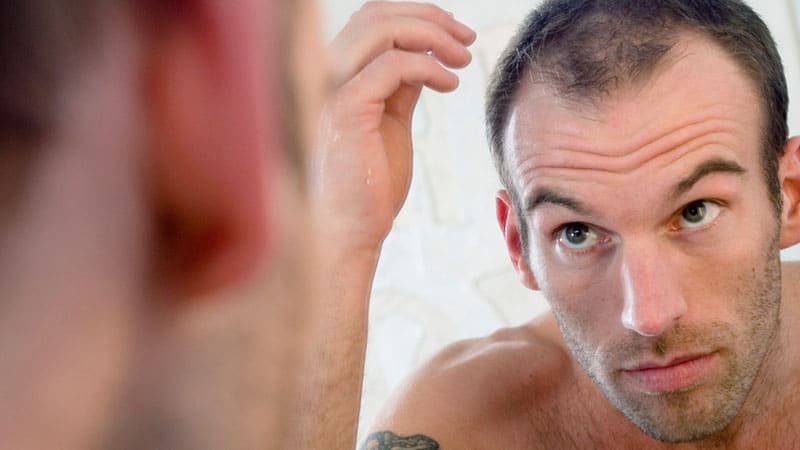Table Of Content

The individual strands of hair may be thin as well as the overall volume of hair strands. Genetics, aging, medical conditions, and lifestyle factors can cause thinning hair. To help boost hair growth and fullness, options include hair care and lifestyle adjustments, topical treatments, and prescription medications or procedures recommended by a healthcare provider.

Does Stress Cause Hair Loss?
The first one, minoxidil, is available in liquid or foam form at 2% and 5% concentrations, Dr. Bridges says. Once you know what you’re up against, there are some easy ways to help manage thinning hair at home or with the help of an expert. Here are the top tips we learned from dermatologists and hair stylists on how to protect your hair and restore some of its fullness and shine. Androgenic alopecia causes the normal hair growth cycle to shorten. As a result, hair doesn’t grow as long or thick as it normally would.
How to Prevent Thinning Hair
In addition, a healthcare provider might recommend forms of light therapy like using the HairMax Lasercomb®. Another FDA-approved laser product is the Theradome LH80 PRO® helmet and low-light laser helmets and caps. The number of strands—of the hair in a given area on your scalp,” Dr. Saedi says.
If you have alopecia, can your hair grow back?
Your provider will also ask about what medications or supplements you currently take. Early treatment of a receding hairline (frontal fibrosing alopecia) might help avoid significant permanent baldness. The cause of this condition is unknown, but it primarily affects older women.
How to Treat and Regrow Thinning Hair
With this in mind, one expert spoke with Express.co.uk about some of the causes of thinning hair. However, more serious hair loss can be upsetting for the sufferer and even an indication that something is wrong with your health. You can look into disguising and covering up your hair loss with things like wigs, hair extensions, scarves and make-up. If hair loss is affecting your relationship with your partner, going to therapy or couples counselling may help. It's also common for women to lose more hair than usual up to 3 months after they've given birth.
Medications to treat hair loss
Both under- and over-active thyroid conditions can cause hair loss, says Dr Fenton. Over-exercise and frequent dieting can affect your thyroid function, too. Blood tests, at the GP or under the supervision of a dermatologist, will show your thyroid status, so the relevant hormones can be prescribed. It’s easy for your GP to do a blood test to check iron (haemoglobin) levels, plus ferritin levels.
Causes and treatments for thinning hair

The doctor may send hair or scalp samples to a laboratory for further testing. They may also order blood tests to rule out an underlying condition. In a 2014 animal study, peppermint led to more hair growth over 4 weeks than saltwater, jojoba oil, or minoxidil 3%. While the process of thinning hair can be concerning at first, many types of thinning hair are treatable.
This Is How Often You Should Be Shampooing Thinning Hair, According to a Dermatologist
Yup, your hair is among the many things your hormones can alter during both the perimenopausal and post-menopausal years. The hormones involved—mainly estrogen and progesterone—affect your hair’s growth cycles, your scalp and follicle health, and the natural oils that keep hair smooth and lustrous. Because of that, you may experience thinning, lack of density, texture changes, and dryness as estrogen wanes.
I always had thick hair but then my luck ran out – I nearly had bald patches but fixed it with 2 oils & a m... - The US Sun
I always had thick hair but then my luck ran out – I nearly had bald patches but fixed it with 2 oils & a m....
Posted: Wed, 24 Apr 2024 14:00:37 GMT [source]
Nutritional supplements like vitamins, minerals, and others might be suggested by your dermatologist if your blood test indicates low levels of biotin, iron, or zinc. Additionally, if your protein intake is insufficient, your dermatologist (specialist of conditions of the skin, hair, and nails) can advise you on ways to increase it. Only consider supplementing with biotin, iron, or zinc upon confirmation of deficiencies through blood tests. Having a deficiency in these vitamins may affect your hair growth. Most people can get the amounts of these vitamins they need by following a balanced diet, but in some cases, a doctor may recommend dietary supplements. Shampoos for thinning hair or hair loss also contain vitamins and amino acids to promote a healthier scalp.
If you’re not sure what’s causing your hair loss or you haven’t had any success with these other tips, it’s important to check in with a dermatologist to figure out what’s going on. A study published earlier this year looked at the effects of RCP and minoxidil in 120 men with hair loss over 24 weeks. The results showed that those who received RCP treatment had significantly more improvement in their hair during the study compared to the minoxidil group. However, it’s not clear how well these results would translate to women or if the over-the-counter products out there containing these ingredients would stack up to those used in the study.
The former magazine-editor-turned-freelance writer regularly covers skincare, beauty, health, and lifestyle topics. Her work has appeared in national publications including Oprah, Shape, Parents, Cosmopolitan, Allure, and websites such as HealthCentral.com bhg.com, and prevention.com." Finally, keep in mind that the same healthy habits recommended for maintaining your physical health will also help your hair. Try to find ways to manage stress, and strive for a well-balanced diet that includes plenty of fruits and vegetables. A 2021 review of 15 studies — including several large randomized control trials that are the gold standard for medical research — found that laser therapy increased hair count in both men and women. You can either purchase over-the-counter laser devices to use at home or receive the treatments from a provider.
Male-pattern baldness typically appears first at the hairline or top of the head. Iron too (in red meat, full fat dairy, eggs and lentils) is vital to nourish healthy hair. Runners may need extra iron due to "foot strike haemolysis" where red blood cells are damaged by the impact of running. There are some nutrition basics when it comes to hair health says Eve.
Researchers believe that cortisol, a stress hormone released by your adrenal glands, may disrupt your hair growth cycle. “It’s best to avoid repetitive wear of hairstyles that pull too tightly and give the hair regular breaks from tension, especially if you notice your hair thinning. "You need the shampoo to keep your hair and your scalp clean. If you shampoo less, will that help stop a hair thinning disease? No. And I actually am concerned you could make it worse." Of course the most obvious sign of hair loss is a visible bald patch.

No comments:
Post a Comment